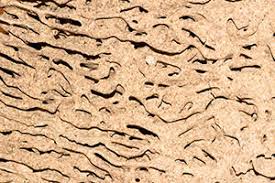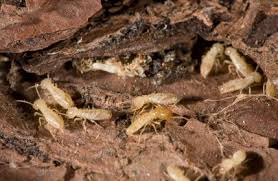The Facts About Termite Control Bait Stations Revealed
Mosquitoes are midge-like flies in the family Culicidae. Females of most species feed on blood and a few act as vectors for malaria and other diseases. Historically they have been controlled by use of DDT and other chemical means, but since the adverse environmental effects of the insecticides has been realised, additional means of control have been tried.

Birds are a significant danger to aircraft, however it's tough to keep them away from airfields. Several methods have been explored. Stunning birds by feeding them a lure containing stupefying substances has been attempted,59 and it can be possible to reduce their numbers on airfields by reducing the number of earthworms and other invertebrates by soil treatment.59 Leaving the grass long on airfields rather than mowing it's also a deterrent to birds.60 Sonic nets are being trialled; these create sounds which birds find distracting and look capable of keeping birds from affected areas.61.
Guidelines and legislation regarding the utilization, allowed methods of application and the storage conditions of pesticides and substances differ from country to country, often being legislated by each nation of territory.
Termite Control Best Method for Dummies
63"Occupational Heath and Safety Regulation 2001 NSW pursuant to the Occupational Health & Safety Act 2000. Part 9.1" (PDF). 17 July 2005. Archived from the original (PDF) on.
Taylor, D., The Entire Contented Cat: Your Ultimate Guide to Feline Fulfilment, David & Charles, 2011, p.9. Archived from the Original

Chrispeels, Maarten J.; Sadava, David E. (1994). Plants, Genes, and Agriculture. Jones and Bartlett Publishers. p. 452. ISBN 978-0-86720-871-9.
Some Known Details About Termite Control Bait Stations
A b"The Annals of Integrated Pest Management". Cornell University. Retrieved 27 August 2017. Which cites Orlob, G.B. (1973). "Ancient and medieval plant pathology". Pflanzenschutz-Nachrichten. 26: 65294.
a b van Emden, Helmut F. (1991). Pest Control. Cambridge University Press. pp. 14. ISBN 978-0-521-42788-3.
van Emden, H.F.; Service, M.W. (2004). Pest and Vector Control. Cambridge University Press. p. 147. ISBN 978-0-521-01083-2.
Flint, Maria Louise; Dreistadt, Steve H. (1998). Clark, Jack K., ed. Natural Enemies Handbook: The Illustrated Guide to Biological Pest Control. University of California Press. ISBNÂ 978-0-520-21801-7. Archived in the original on 15 May 2016.

Rumored Buzz on Termite Control Best Method
"Augmentation: The Periodic site Release of Natural Enemies". University of Wisconsin. Archived in the original on 17 March 2016. Retrieved 27 August 2017.
"Agriotes sputator L. - Common Move Beetle (Wireworm)". Interactive Agricultural Ecological Atlas of Russia and Neighboring Countries. Retrieved 27 August 2017.
Wright, R. j (1984). "Evaluation of crop rotation for control of Colorado potato beetle (Coleoptera: Chrysomelidae) in commercial potato fields on Long Island". Journal of Economic Entomology. 77 (5): 12541259. doi:10.1093/jee/77.5.1254.
Shelton, A. M.; Badenes-Perez, F. R. (6 December 2005). "Concepts and applications of trap cropping in pest management". Annual Review of Entomology. 51 (1): 285308. doi:10.1146/annurev.ento.51.110104.150959. PMIDÂ 16332213.
Indicators on Termite Control Bait Stations You Should Know
a b Holden, Matthew H.; Ellner, Stephen P.; Lee, Doo-Hyung; Nyrop, Jan P.; Sanderson, John P. (1 June 2012). "Designing an effective trap cropping plan: the consequences of attraction, retention and plant plasma distribution". Journal of Applied Ecology. 49 (3): 715722. doi:10.1111/j.1365-2664.2012.02137.x.
Hill, Dennis S. (1983). Agricultural Insect Pests of the Tropics and Their Control. CUP Archive. pp. 45. ISBN 978-0-521-24638-5.
Georghiou, G.P. (2012). Pest Resistance to Pesticides. Springer Science & Business Media. pp. 13. ISBN 978-1-4684-4466-7.
a b Carrington, Damian (29 June 2017). "Pesticides damage survival of bee colonies, landmark study reveals". The Guardian. Retrieved 27 August 2017.
Some Ideas on Termite Control Best Method You Need To
"Pesticides". National Institute of Health Sciences. National Institute of Environmental Health. Retrieved 5 April 2013.
Lieutier, Franois; Day, Keith R.; Battisti, Andrea; Grgoire, Jean-Claude; Evans, Hugh F. (2007). Bark and Wood Boring Insects in Living Trees in Europe, a Synthesis. Springer. p. 39. ISBN 978-1-4020-2241-8.
Humme, Hans E.; Miller, Thomas A. (2012). Techniques in Pheromone Research. Springer. p. 432. ISBN 978-1-4612-5220-7.
Our Termite Control Best Method PDFs
Macdonald, D. R. (1968). "Management of Spruce Budworm Populations". The Forestry Chronicle. 44 (3): 3336. doi:10.5558/tfc44033-3.
a b Pat O'Connor-Marer (2006). Residential, Industrial, and Institutional Pest Control. UCANR Publications. pp. 217. ISBN 978-1-879906-70-9.
Eger, Christopher (28 July 2013). "Marlin 25MG Garden Gun". Marlin Firearms Forum. Outdoor Hub LLC. Archived from the original on 18 September 2016. Retrieved 17 September 2016.
The Best Strategy To Use For Termite Control Best Method
a b Pat O'connor-marer (2006). Residential, Industrial, and Institutional Pest Control. UCANR Publications. ISBNÂ 978-1-879906-70-9.
Flint, M.L.; Wilen, C.A. "Snails and slugs". Pests in Gardens and Landscapes. visit this web-site UC click over here now IPM. Retrieved 28 August 2017. CS1 maint: Multiple names: authors list (link)